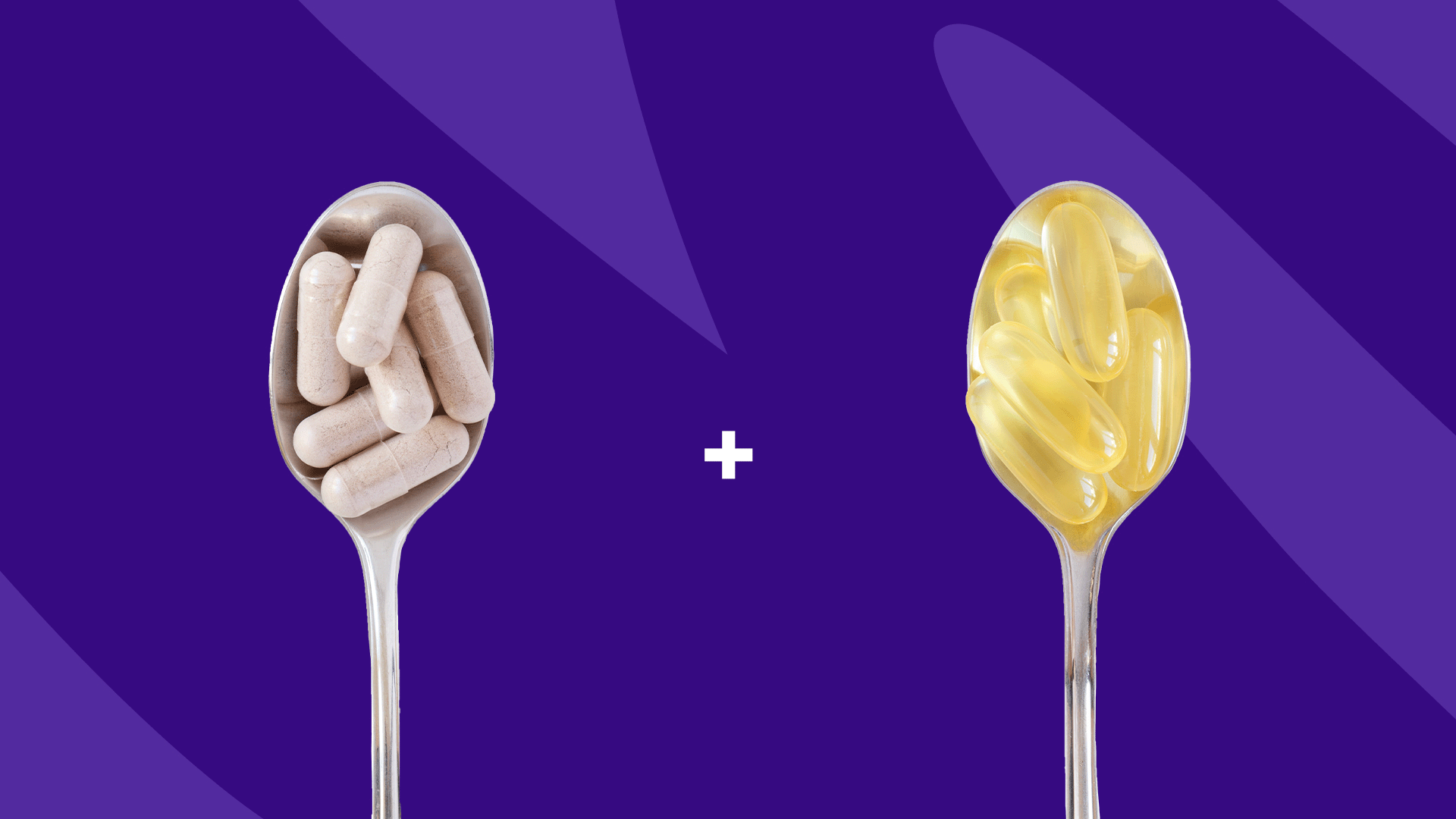From collagen powder and probiotics to prenatal vitamins and St. John’s Wort, the sale of supplements is skyrocketing. In fact, according to data from the 2017-2018 National Health and Nutrition Examination Survey, an estimated 57% of Americans older than 20 take at least one dietary supplement. Multivitamins, vitamin D, and omega-3 fatty acids are the most popular.
Whether you take a daily multivitamin to enhance your overall health, or you rely on herbal supplements to fill in nutritional gaps, it’s important to be aware of possible interactions. Vitamins are organic compounds that are essential in small amounts for normal metabolism. Taking certain vitamins together can affect their absorption in the body—sometimes making it worse and other times improving bioavailability. Additionally, some vitamins can interfere with the efficacy of medication and even exacerbate side effects. Although measuring serum levels of several vitamins is widely available, testing for deficiencies is usually unnecessary. Here’s what you need to know about using vitamin supplements wisely.
What vitamins should not be taken together?
It is very important to read the label and the suggested supplementation protocol for each supplement you are taking, advises Jenna Litt, RD, CDN, a registered dietitian at Northwell Health’s Lenox Hill Hospital in New York. “For example, some supplements may need to be taken with food, some may be administered daily, multiple times a day, or even weekly,” she says. “If you are not sure about dosage, contact your healthcare provider to ensure you are taking proper dosages.”
It’s also important to know what vitamins should not be taken together. Here are supplements that don’t go together—or don’t go with food.
Magnesium and calcium
Although these two minerals work together, they must be in balance to be effective. While magnesium does help with calcium absorption, too much calcium can actually have the opposite effect, preventing magnesium from being absorbed. Research indicates that a calcium to magnesium ratio above 2:1 is linked to an increased risk of metabolic, inflammatory, and cardiovascular disorders. To be sure you’re getting the correct ratio, consult with your provider for guidance on combining calcium and magnesium mineral supplements.
Iron and green tea
It’s not a good idea to take your iron supplement (or eat iron-rich foods) at the same time as green tea. That’s because the main component in green tea, epigallocatechin gallate (EGCG), binds with iron and reduces its absorption. A 2016 case study linked drinking large amounts of green tea with the development of iron deficiency anemia. Green tea has health benefits though, so feel free to imbibe it—just do so in moderation and wait two hours after taking an iron supplement.
Vitamin C and B12
It’s not advised to take vitamin C and vitamin B-12 at the same time, says Litt. That’s because high doses of vitamin C can reduce the amount of vitamin B-12 that’s absorbed and metabolized by the body, she says. Be sure to take vitamin C at least two hours after vitamin B-12. This way, you can avoid a B-12 deficiency.
Fat-soluble and water-soluble vitamins
Some combinations should be avoided, even if they aren’t inherently problematic. For example, although it’s safe to take vitamin D with vitamin B12, it’s not advisable, says Virgilio Sanchez, MD, a board certified family medicine physician at Conviva Care Center in Miami, Florida. That’s because vitamin D is a fat-soluble vitamin that’s absorbed better with food, while B-12 is a water-soluble vitamin that should be taken on an empty stomach, says Dr. Sanchez. The same goes for vitamin C and vitamin D—they should be taken at different times.
Similarly, water-soluble vitamins, which are not stored in the body, like vitamin C, B vitamins—including thiamine (B1), riboflavin (B2), niacin (B3), pantothenic acid (B5), pyridoxine (B6), biotin (B7), folate/folic acid (B9), and cobalamin (B12)—require water to be absorbed and used by the body, says Dr. Ormond. It’s best to take them without food with a glass of water.
Vitamin interactions chart |
||
|---|---|---|
| Vitamin | Interactions | How to improve absorption and reduce side effects |
| Magnesium |
|
|
| Iron |
|
|
| Vitamin C |
|
|
| Fat-soluble vitamins (vitamins A, D, E, K) |
|
|
Which vitamins should be taken together?
In general, water-soluble vitamins can be taken together without food, and fat-soluble vitamins can be taken together with food containing healthy fats. The following combinations of supplements may actually be more effective when combined.
Vitamin D, vitamin K2, and other fat-soluble vitamins
Vitamin D and vitamin K, (especially K2) complement each other, Dr. Sanchez says. “Vitamin K2 helps calcium move from the blood to the bones,” he says, “whereas if you take large doses of vitamin D without sufficient K2, the calcium can go to the wrong places.”
Vitamin K1, or phylloquinone, is present in dark leafy greens, while vitamin K2 (menaquinones) is found in fermented and animal-based foods. Research indicates the two fat-soluble vitamins (vitamin D and vitamin K2) work synergistically to ensure that calcium is absorbed by the bones rather than building up in your arteries.
Fat-soluble vitamins, such as A, D, E, and K, can be taken at the same time. According to Sean Ormond, MD, an interventional pain physician at Atlas Pain Specialists in Phoenix, Arizona, fat-soluble vitamins are stored in the body’s liver, fat, and muscles, and should be taken with fat from a meal in order for your body to best absorb and use them. “A lot of fat is not required. Healthy plant-based foods like avocado or nuts do just fine,” Dr. Ormond says.
Magnesium and vitamin D3
The actions of these two vitamins are enhanced when taken together, says Litt. A 2018 study published in The American Journal of Clinical Nutrition shows that without enough magnesium, vitamin D synthesis and metabolism in the body is impaired. In other words, magnesium is required to convert vitamin D into a form that the body can use. That’s why your provider might advise combining these two supplements.
Copper and zinc
When it comes to combining copper with zinc, it’s all about balance. Zinc interferes with copper’s absorption, but taking too much zinc can even cause a copper deficiency. If you’re taking zinc, it’s advised that you take a 2 mg copper supplement as well to support the body’s balance of these two minerals.
Omega-3s and vitamin E
Taking these two supplements together may enhance heart health. Omega 3 fatty acids are an essential fat that can protect against medical conditions like high blood pressure, heart disease, and stroke. Vitamin E is an important nutrient with antioxidant properties that enhances the immune system. One small study of 60 male patients with coronary artery disease found that a combination of omega-3s and vitamin E had beneficial effects on serum insulin and insulin resistance. Research has linked decreased insulin resistance with the development of heart disease. Ask your provider if you’d benefit from this combination.
Iron and vitamin C
Iron is the most common nutrient deficiency in the United States. The mineral is vital for optimal function of the human body—it is a major component of hemoglobin, a protein in red blood cells that transports oxygenated blood from the lungs to other areas of the body. Insufficient iron, or anemia, impedes this process, resulting in fatigue and making it necessary to supplement with iron.
Some providers suggest pairing iron with vitamin C to maximize its absorption, but the jury’s still out on whether this is true. A 2020 randomized clinical trial of 440 individuals with anemia found no difference in iron absorption among the group who took iron with vitamin C and the group who took iron alone. That said, there’s no harm in combining the two supplements, so it can’t hurt to try.
RELATED: How to make sure you absorb your supplements
If there are no known interactions between vitamins, it is okay to take multiple vitamins at once, Litt says. If you are unsure if an interaction exists, contact your healthcare provider.
Lea este artículo en español aquí.
Sources
- Dietary Supplement Use Among Adults: United States, 2017–2018, Centers for Disease Control and Prevention (2021)
- The Usefulness of Calcium/Magnesium Ratio in the Risk Stratification of Early Onset of Renal Replacement Therapy, Diagnostics (2022)
- Green tea and iron, bad combination, Penn State (2018)
- Iron deficiency anemia due to excessive green tea drinking, Clinical Case Reports (2016)
- Vitamin C, University of Rochester Medical Center
- Vitamin B-12, The Mayo Clinic (2023)
- Vitamin K, National Institutes of Health (2021)
- The Synergistic Interplay between Vitamins D and K for Bone and Cardiovascular Health: A Narrative Review, The International Journal of Endocrinology (2017)
- Vitamins, National Library of Medicine (2023)
- Magnesium status and supplementation influence vitamin D status and metabolism: results from a randomized trial, American Journal of Clinical Nutrition (2018)
- Zinc, Mount Sinai
- Omega-3 Fatty Acids: An Essential Contribution, Harvard T.H. Chan School of Public Health
- Vitamin E, Mayo Clinic (2023)
- Various Effects of Omega 3 and Omega 3 Plus Vitamin E Supplementations on Serum Glucose Level and Insulin Resistance in Patients with Coronary Artery Disease, Iranian Journal of Public Health (2016)
- Association between insulin resistance and the development of cardiovascular disease, Cardiovascular Diabetology (2018)
- Iron and vitamin C: the perfect pair? Michigan State University (2015)
- Taking Iron Supplements, National Library of Medicine (2023)
- The Efficacy and Safety of Vitamin C for Iron Supplementation in Adult Patients With Iron Deficiency Anemia, A Randomized Clinical Trial, Hematology (2020)











